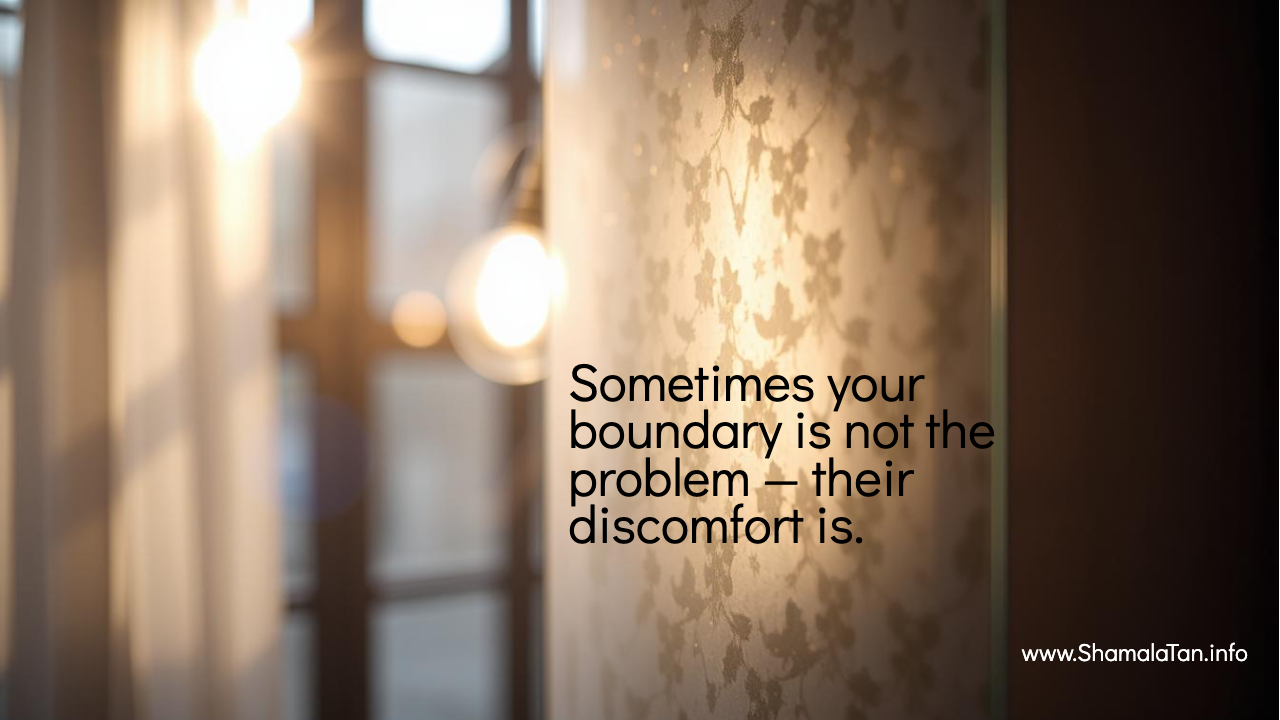When You Set a Boundary and They Call It “Stress"

I had an interesting experience recently with a family member that made me reflect on how easily people misunderstand boundaries.
They had said earlier that they would take responsibility for something, and I trusted that they would follow through. But partway through, they turned around and asked me to do some of the tasks instead, even though they knew I already had a lot on my plate. So, I asked a simple, direct question: “Why did you say you would do it, and then ask me to take it on?”
But instead of acknowledging what I said, the person assumed that I must be stressed at work, tired, or overwhelmed. In their mind, my boundary could not possibly come from clarity. It had to come from stress.
That moment made me realise something I see often in my coaching work as well: some people are so disconnected from their own behaviour that they cannot recognise someone else’s clarity without interpreting it as a reaction. They see boundaries as emotional outbursts instead of intentional choices.
WHEN PEOPLE CANNOT SEE THEMSELVES
When you set a boundary, you are essentially saying, “This part is mine, and that part is yours.” You are clarifying what you are responsible for and what you are not.
For people who are used to avoiding responsibility, that kind of clarity can feel deeply uncomfortable. It quietly exposes the gap between what they say and what they actually do. So instead of reflecting, they rewrite the story to protect themselves. Their version usually sounds something like:
- “You’re tired.”
- “You’re too busy.”
- “You’re stressed.”
By turning your clarity into a sign of stress, they make it easier to avoid their own discomfort. It is rarely malicious. Often, it is just emotional immaturity, a lack of self-awareness that cannot yet tolerate self-reflection.
And when that happens, remember: this has little to do with you. It is not your emotional state they are reacting to. It is their own resistance to being confronted, even indirectly, with the truth. Your boundary becomes a mirror they cannot look into.
WHAT YOU CAN DO INSTEAD
The next time this happens, the first thing to do is stay grounded. You do not need to defend your boundary or convince anyone that you are calm or collected. The more you try to explain, the easier it becomes for them to twist your words into something they can manage emotionally.
Speak simply and clearly. You might say something like, “I am not stressed. I am just being clear about what is mine and what is not.” That sentence alone holds immense power because it refuses to feed into their narrative.
And most importantly, do not make it your job to make them understand. Some people genuinely cannot see what you are saying not because you have not explained it well enough, but because accepting your clarity would require them to confront parts of themselves they are not ready to face. Boundaries are not for their comfort. They are for your peace of mind.
Emotionally healthy people understand boundaries. They see them as expressions of self-respect, maturity, and trustworthiness. When you set a boundary, they recognise it as a healthy way to keep the relationship balanced and respectful.
Emotionally unaware people, on the other hand, often see boundaries as rejection or hostility. To them, any assertion of self becomes a threat. They might accuse you of being “too sensitive,” “too rigid,” or, in this case, “too stressed.” What they cannot admit is that your clarity exposes their lack of accountability.
As you grow emotionally, you begin to see who can handle your boundaries and who cannot. You stop mistaking other people’s discomfort for your wrongdoing. You learn that someone else’s inability to see your calmness does not mean you have lost it. It simply means they cannot meet you at that level of self-awareness yet.
When you honour your boundaries, you are not being difficult or defensive. You are practising emotional integrity the kind of integrity that protects your energy, clarifies your relationships, and keeps you aligned with what truly matters.
If you often find yourself second-guessing your boundaries or feeling guilty after standing up for yourself, it may be time to explore this on a deeper level.
The Emotional Empowerment Blueprint is a 12-month self-study and group coaching journey designed to help you build emotional clarity, strengthen your inner boundaries, and develop the kind of calm confidence that is not easily shaken by other people’s reactions. You will learn how to recognise what is truly yours to carry and how to stop taking responsibility for what is not.
You can learn more or join the program here:
► Emotional Empowerment Blueprint
© 2025 Shamala Tan

